Life Without: Chapter 2, the star witness recants
The lawyers for David Robinson expected Albert Baker, 40 at the time, to recant under oath at an appeal Nov. 5, 2004. Two months prior, Baker had sat down and talked with investigator Butch Johnson. He did not submit to be recorded, and he did not sign an affidavit. But Baker agreed to recant and offered remorse for lying and pinning Sheila Box's murder on Robinson...
The following story is one installment of an investigative series of the questionable conviction of David Robinson, who is accused of shooting Sheila Box in 2000. Please read all our other related stories and view our video series at www.semissourian.com/lifewithout.
The lawyers for David Robinson expected Albert Baker, 40 at the time, to recant under oath at an appeal Nov. 5, 2004.
Two months prior, Baker had sat down and talked with investigator Butch Johnson. He did not submit to be recorded, and he did not sign an affidavit. But Baker agreed to recant and offered remorse for lying and pinning Sheila Box's murder on Robinson.
Johnson provided memorandums about that Sept. 30, 2004, meeting.
Johnson showed Baker a transcript of Romanze Mosby's confession to shooting Box.
"Tell David I'm so sorry," Baker said, which Johnson read aloud at the hearing. "How can he ever forgive me for what I did?"
Johnson also sent Baker a letter giving him some advice Oct. 25, 2004. He wrote the letter after Baker failed to meet with Johnson after they talked Sept. 30.
"If … you want to manufacture a story that is tailored to your original trial testimony in order to try to avoid a perjury charge that is entirely up to you," Johnson wrote. "However, if that is your intent, then I do recommend that you bring an attorney with you, because you will need someone to then deal with a pissed-off judge and a possible second perjury charge. A bulls--- story will only serve to compound your problem. … It is our contention here that the state won't go after you if stand up straight and tell the truth. The whole truth!"
Everything changed when Baker took the stand for the second time in front of Judge David Dolan in Benton, Missouri.
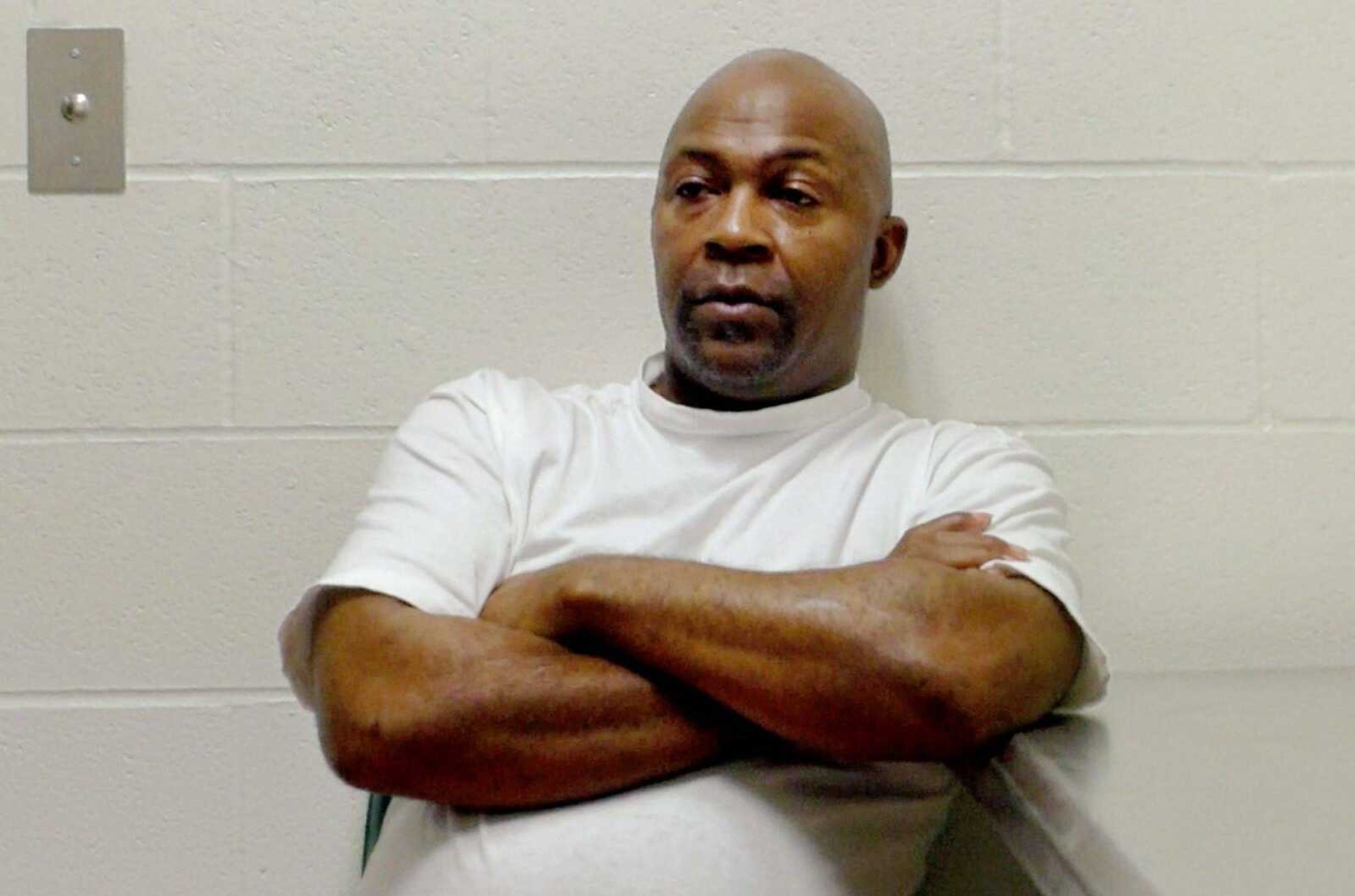
Instead of recanting, Baker declared he was sticking to his original testimony, and he had been pressured by Johnson.
Baker later would tell Robinson's lawyer, Jim Wyrsch, in a recorded interview he took back the recantation after he talked with Sikeston, Missouri, police -- particularly detective John Blakely.
"All because of the police," Baker said.
"Tell me about that," Wyrsch said.
"Blakely and them showed up, and I told them somebody paid me a visit," Baker said. "...And then, well, he stated that that's messing and tampering with a witness, and I never heard nothing back from [Johnson]. So [Blakely] like gave me transcripts of … from the original trial to read back over, because when it came time (to) come back to court that I stuck to that story."
Baker said in an interview with the Southeast Missourian he believes Blakely and Sikeston police knew he was lying.
"They stuck to the lie," Baker said of police and prosecutors. "I lied for them. Everyone that had something to do with this case, they should be locked up along with me."
Sikeston Department of Public Safety chief Drew Juden declined a request by the Southeast Missourian for an interview. Blakely did not return a phone call.
"We cannot comment until all legal proceedings are complete," Juden wrote in an email. "It has been agreed on with the [attorney general's] office."
2012
Baker was the key to Robinson's case.
By the time of that 2004 appeal, Johnson already had the audio-recorded confession from Mosby he shot Box on Aug. 5, 2000, and an under-oath recantation from Scott County jailhouse informant Jason Richison.
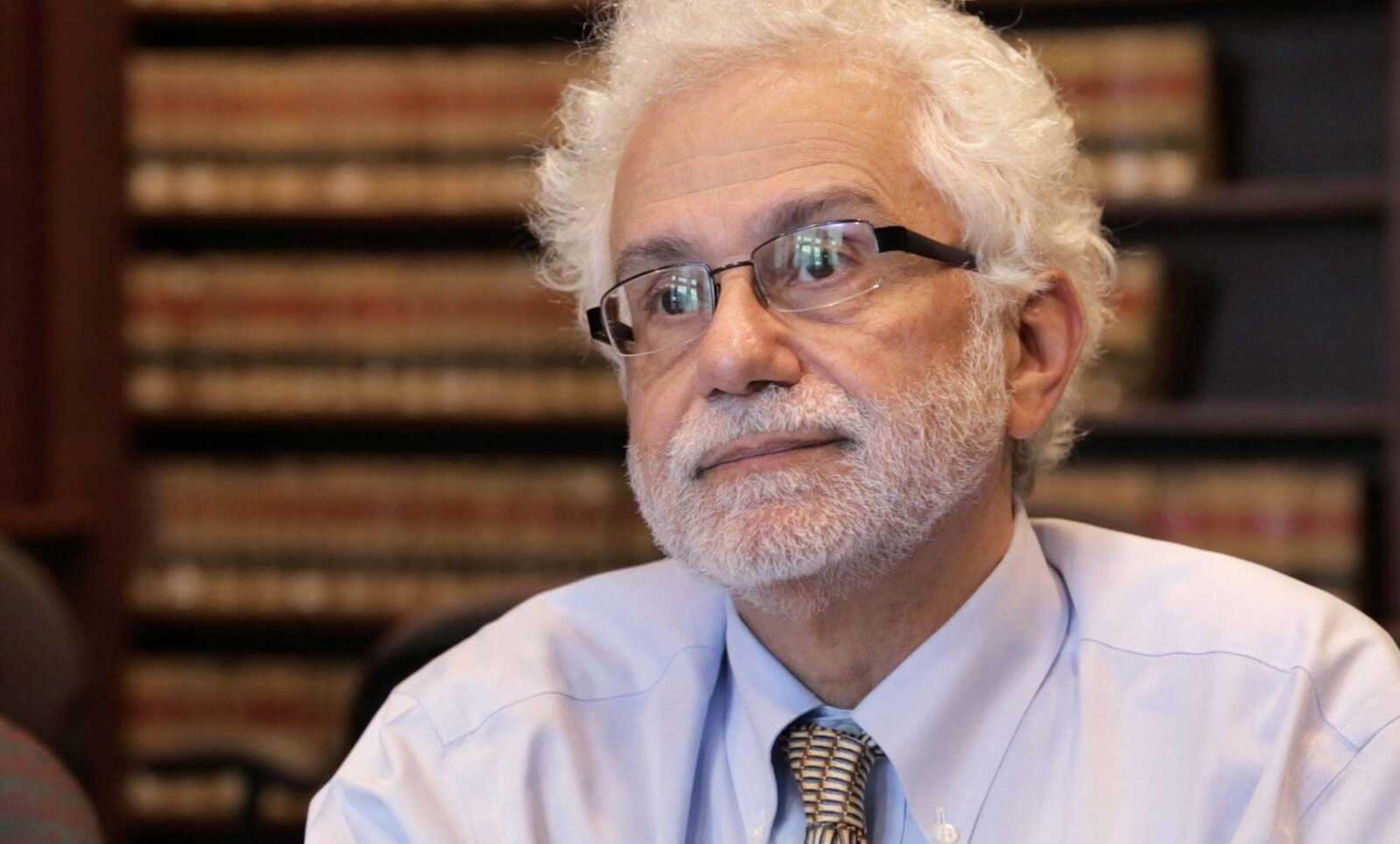
Baker went back on his promise to Johnson to recant in 2004, however, and Robinson's appeal was denied. There still was power behind Baker's firsthand testimony he had seen Robinson walk over and shoot Box through the window of her SUV.
"Witness testimony is generally very powerful," Washington University law professor Peter Joy said. "When a jury (sees) somebody point to somebody and say, 'That's the person I saw shoot someone,' it's very persuasive."
Wyrsch started trying to talk to Baker after he took control of the case about six months after Mosby's death.
He got in touch with Baker while he was three hours away at Northeast Correctional Center in Bowling Green, Missouri. Baker pleaded guilty to distribution of a controlled substance in December 2009 and felony theft in June 2012.
Wyrsch drove to Bowling Green and stepped into the warden's office. The warden asked Baker whether he would consent to the interview, and Baker said no.
"I was there for all of three minutes," Wyrsch said. "Enough time to empty my pockets and go through the metal detector."
It took Wyrsch about six meetings between 2010 and 2012 before Baker trusted him enough to talk on the record.
In 2012, while he was in custody in Eastern Reception, Diagnostic and Correctional Center in Bonne Terre, Missouri, Baker relented and talked to Wyrsch on video.
Wyrsch had just finished the video introduction when Baker began unloading.
"I gave false testimony about David Robinson," Baker said, without hesitation.
"Did you see any part of the actual shooting of Sheila Box?" Wyrsch asked.
"No, I did not."
Baker said he lied about Robinson in part because he was angry at Robinson for a perceived slight.
A week before the shooting, Robinson pulled up in a car with a woman and asked Baker's wife whether she wanted to get high, Baker said later in an interview with the Southeast Missourian.
"I found out later on that his wife was somebody I messed with," Robinson said. "I didn't know that was his wife."
Baker also lied because he wanted to get out of jail, he said.
Baker was arrested for stealing air conditioners shortly after Box was killed. He did not speak to detectives until 12 days after the killing, but afterward, he was released on an own-recognizance bond.
"I had already knew about they was investigating about a murder, but I didn't really know that's who they wanted -- David Robinson -- and I just put it together on my own, you know. I told one lie and then another, then it just got to being where I believed it myself," Baker said on the video with Wyrsch.
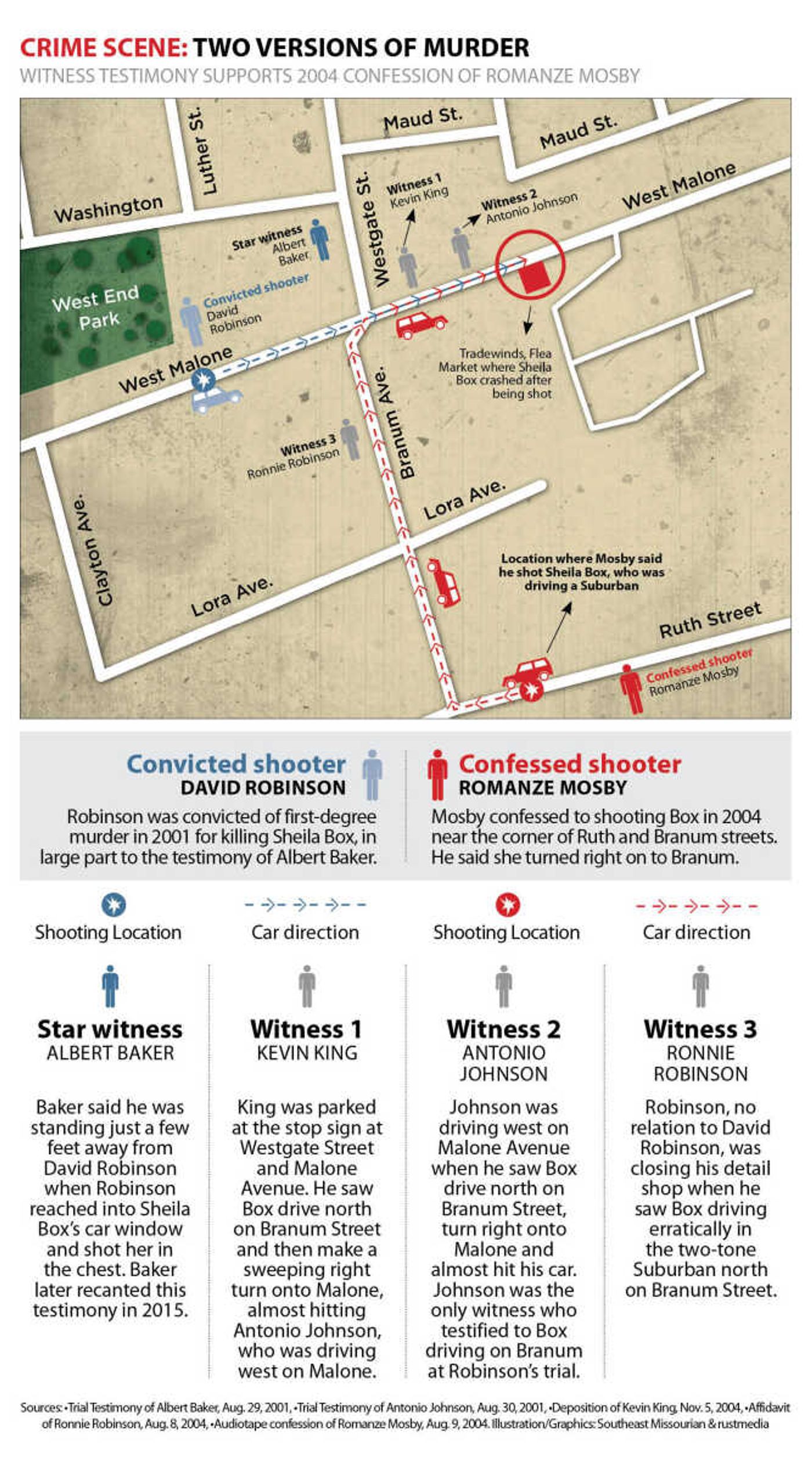
"But the cops were going along with it, and they told me they had certain evidence of clothing and even a gun, but they never presented it that I know of, but I know that they just wanted to get David Robinson back off the street. And they used me to help them," he said.
August 2001
Baker originally testified in the trial he was walking back from buying crack in the Bottoms area of Sikeston. He told the jury he was heading across a grassy area between Osage Street and Malone Avenue between 10 and 10:30 p.m. Aug. 5, 2000.
He testified he saw Box parked at a pay phone in a parking lot of an abandoned car wash on Malone Avenue, about 50 feet from Branum Street.
He told jurors he heard a shot fired, and then saw Robinson walk up to Box's car, stick his left arm into the window and shoot Box once in the chest before turning and running back across Malone Avenue.
Baker was the only one who testified to seeing the murder.
"The whole story is so bizarre," Wyrsch said. "That's not how murders happen."
According to Baker's original testimony, Box then began driving fast, turning left onto Branum before turning right onto Malone Avenue. Baker said she almost hit him before and a car before crashing into The Tradewinds flea market.
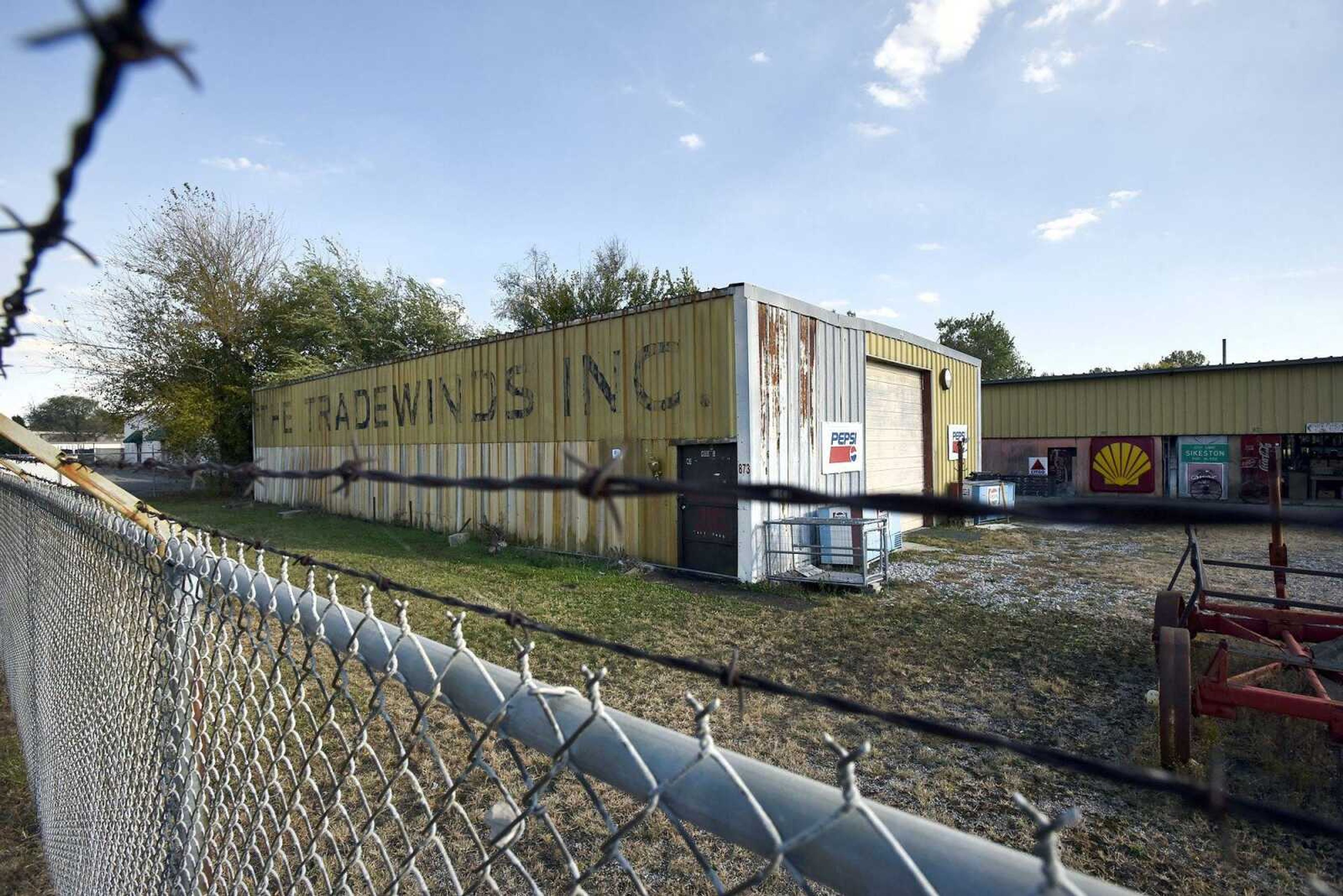
Baker later told Wyrsch in the videotaped statement the only truth in his story was he saw Box's Suburban driving first on Branum, then on Malone and crashing into The Tradewinds.
Based only on what the jury heard Aug. 31, some aspects of Baker's story still sound suspicious.
Robinson is right-handed.
"I wouldn't even do that at a gun range," Robinson's brother, Justin, said of shooting with his off hand.
In a statement to Blakely from Aug. 18, 2000, Baker said he had seen Robinson do anything only with his left hand.
On a Saturday night during the summer, the intersection of Malone Avenue and Branum Street, one of west Sikeston's main intersections, would have teemed with people.
"If it went down like Baker said it went down, 40 people would have seen her get shot," Justin Robinson said in an interview with the Southeast Missourian.
Defense witness Antonio Johnson testified at Robinson's trial Box was driving west on Malone when she almost ran into him while he was driving -- a wide, looping trajectory from Branum that would be improbable if Baker's story were true.
He added he saw the Suburban on Ruth Street earlier that night; Mosby said he shot Box on Ruth Street.
In September 2000, Antonio Johnson was in the same pod in Scott County Jail as Robinson, as pointed out during his testimony under cross-examination.
Neither Kevin King nor Ronnie Robinson -- who is not related to David Robinson -- testified at Robinson's trial, but in depositions in November 2004, they said they saw Box driving the Suburban on Branum Street, almost hitting Johnson.
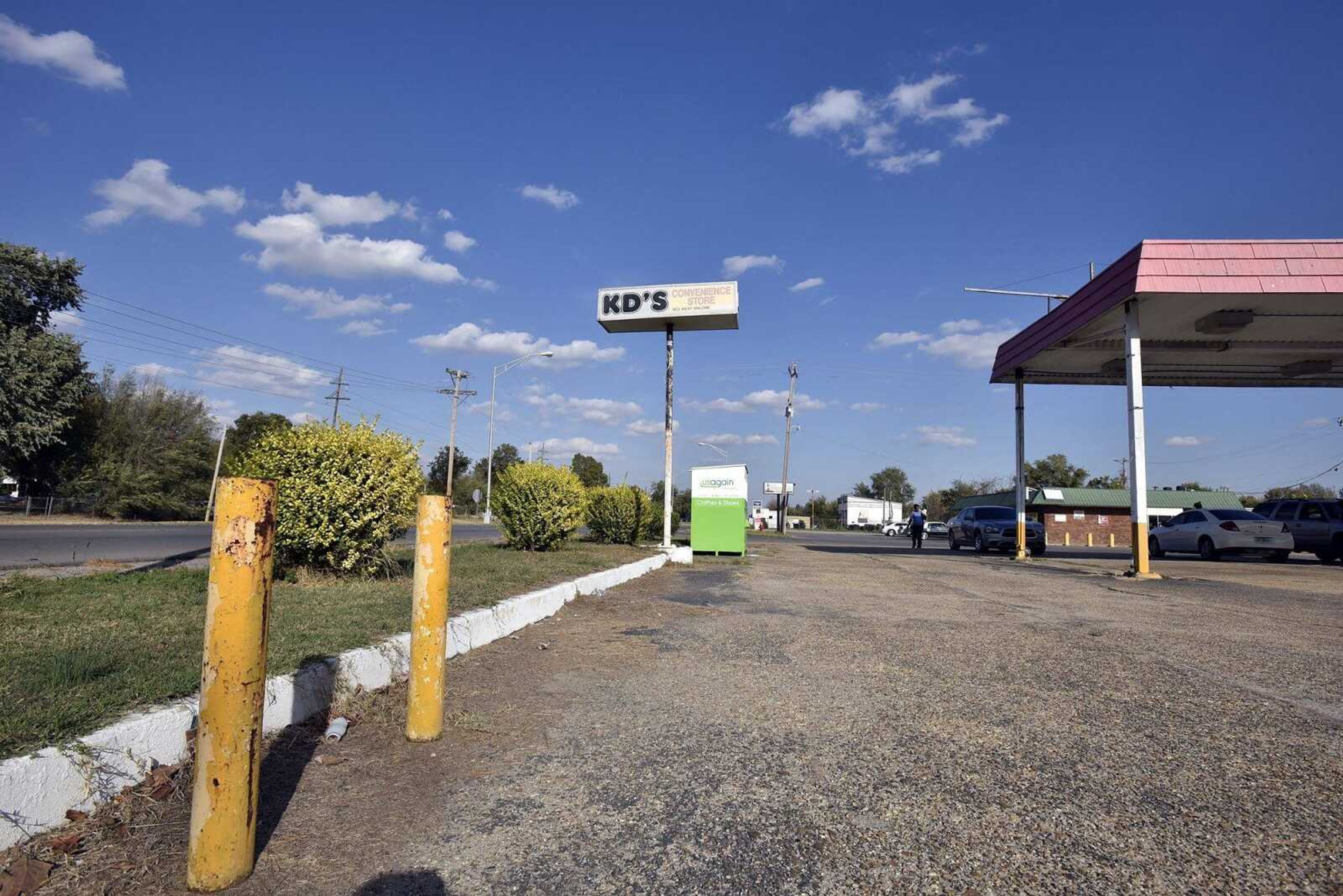
King and Robinson knew Baker by sight but did not see him that night, they said. King added he would have been in a position, stopped at West Gate Street, to see David Robinson shoot Box if Baker's story were true.
Lillian Collins was working at her family's convenience the store at the corner of Malone Avenue and Branum Street on the night of the killing, including at the drive-through window. She testified she could see the pay phone where Box would have been parked from the window at Robinson's trial.
Collins said she did not hear a gunshot that night but had heard gunshots on previous nights.
Then there are the questions of Baker's validity as a witness.
Gary Wolferding testified he was staying with Baker shortly after Baker was released from jail. Wolferding said he was reading about Robinson's case in the Southeast Missourian and asked Baker about his participation.
"...He told me that he heard, he was standing on the pay phone in front of the Collins store and that he heard the two gunshots and that all he saw was headlights," Wolferding told jurors. "He told me he didn't see the shooter."
Between December 2000 and May 2001, Wolferding served some time with Robinson in the Scott County Jail.
Under cross-examination from public defender Chris Davis, Baker said he smoked crack every other day. Over the course of three court appearances, Baker's testimony about the frequency of his crack use changed.
Davis also caught Baker in several lies at Robinson's trial.
Baker said he had not pleaded guilty or been found guilty of any crimes in the past. Davis produced a transcript from a deposition from March 2001 where Baker said he was convicted of felony theft in 1986. Davis ran through several other previous cases, including violating an order of protection in 1997, misdemeanor assault on his stepson in 1997 and misdemeanor possession of drug paraphernalia July 11, 2000, less than a month before Box's killing.
During the preliminary hearing in September 2000, Baker said he was not aware of pending charges, but Baker admitted he had a pending charge for burglary when pressed by Davis at trial.
Davis asked Baker about receiving an own-recognizance bond Aug. 18 after talking to Blakely.
"Now, according to you, giving your story to Detective Blakely had nothing to do with you being released on your own recognizance, right?" Davis asked.
"No, it doesn't," Baker responded.
"You were released from jail, even though you had a pending burglary charge?"
"At the time, I didn't know I had a pending burglary charge when I was released."
Davis brought up payments Blakely had made to Baker between Aug. 17 and Sept. 27, at a time when Baker was living in a house, not paying rent, did not have a job and was smoking crack regularly. Blakely said these payments were for witness protection in his testimony at Robinson's trial.
"So, Detective Blakely was not paying you any money from Aug. 18, the time you got out of jail till Sept. 27?" Davis asked.
"No, I'm a hustler," Baker responded.
Davis produced 11 receipts provided by Blakely and signed by Baker from Aug. 18 through Sept. 14. The amounts in those receipts ranged from $10 to $100. Those receipts were submitted as evidence. The documents, signed by Blakely, were labeled as "information" or "expenses."
"Some of the payments aren't consistent with what I would describe as a witness-protection payment," Robinson's lawyer, Jonathan Potts, said in an interview with the Southeast Missourian. "The point of this was to put him up in an apartment and keep him away, and it wasn't that the police were paying the landlord his rent. They were handing him small amounts of money ... and just giving him cash. There's a witness who admitted that Albert spent that money on crack."
Blakely said in testimony during the evidentiary hearing May 15, 2015, he paid Baker $1,500 or more for witness protection.
During a 2015 deposition when he recanted, Baker confirmed the figure $1,500 under cross examination. During the 2015 deposition, Baker repeatedly said he was paid to lie.
"That testimony was all fabricated and all a lie," Baker said in an interview. "I was getting paid."
In a May 14, 2000, evidentiary hearing for Robinson, Blakely said he never had done witness protection in any other case in his 24 years as a detective.
May 8, 2015
Baker was late.
Wyrsch was ready to question Baker under oath, potentially the last piece of the puzzle in the Robinson case. He could not help but think Baker was going to cave on this hearing like he had in 2004. The memory of driving three hours to the middle of nowhere to be turned down without a question was still clear.
Baker showed up. He would have been on time, but he had gone to the courthouse, not realizing the deposition was to be conducted in a law office across the street.
Before the deposition began, Baker was hit with a hard reality from assistant attorney general Katharine Dolin.
"...I'd like to make you aware, obviously you have concerns about perjury. I'd like to make you aware that for statements made during the course of a murder trial, perjury is a class A felony. There's no statute of limitations. We can bring that charge at any time," Dolin said.
"The exposure that you're looking at is 10-year mandatory minimum to 30 years to life. Perjury is charged per false statement, every time you've made a false statement under oath, and I expect that if these two gentlemen would like to elicit some sort of confession of perjury or otherwise get out that you may have made some false statements during the trial of David Robinson the state intends to prosecute you to the fullest extent of the law. And so I want to make sure that it's clear to you that anything you say in this room will be used against you and that you ..."
Dolin did not finish her statement before Baker responded.
"Now, I like that part," Baker said. "You didn't say could. You said will be."
Dolin continued that the deposition could end at any time.
Baker responded he was under subpoena, and, "You know, it's the right thing to do."
At that point, Baker said he felt as if he had been punished by karma for his lies. His vision had eroded. During the deposition, he talked about bulging discs in his back.
In an interview, Baker said he testified against Robinson to try to change his life for the better. He thought if he could get out of jail, maybe move away from Sikeston, maybe he could turn things around, he said. But his life only got worse after he testified against Robinson.
It felt like a meal that didn't sit right, Baker said, but the weight was resting on his soul.
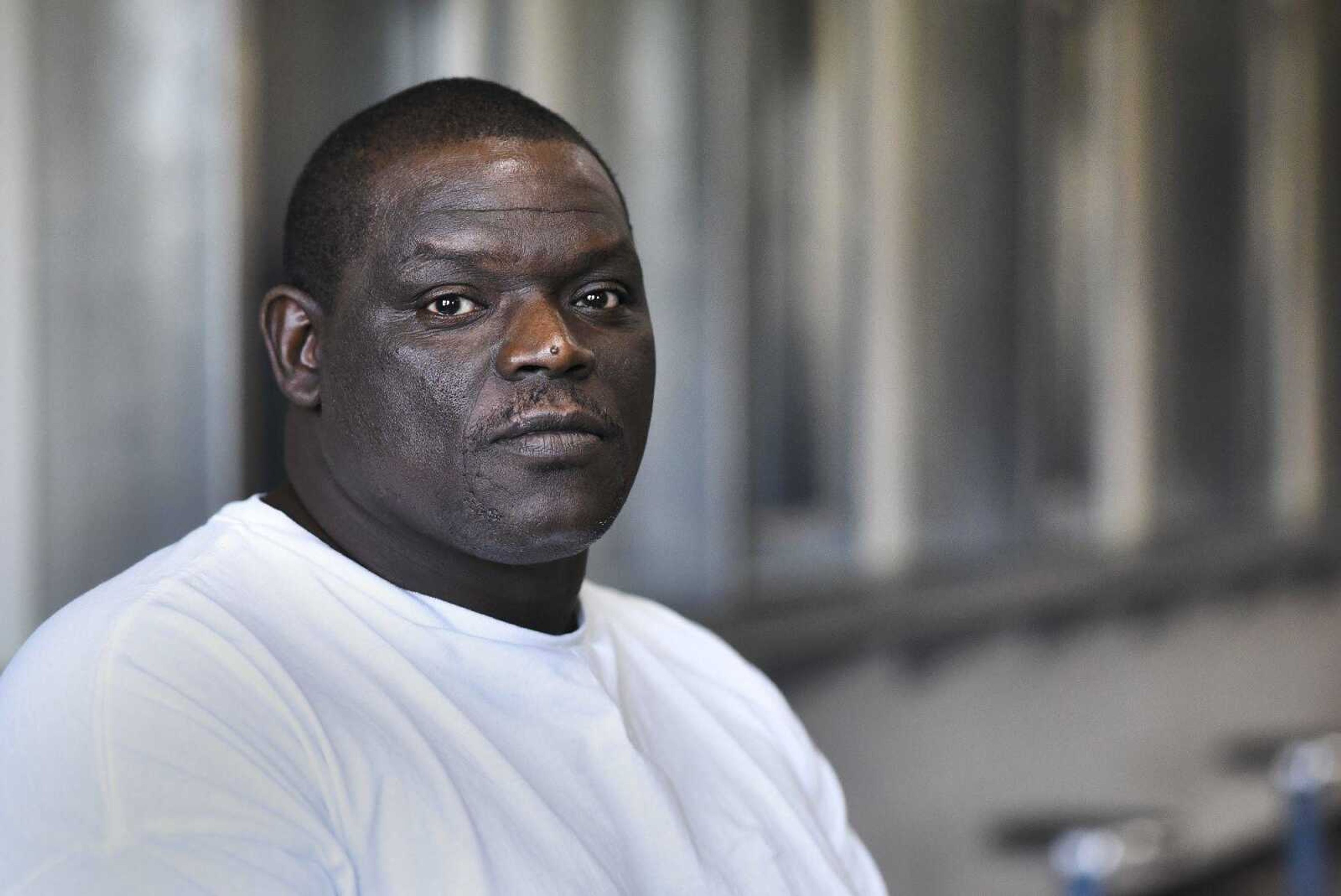
"I made my peace, and I accept it," Baker said. "I'm at the point where if they lock me up, I should finish up the time (Robinson) should have served for."
Before going forward with the hearing, Baker asked about receiving 10 to 30 years for every lie.
"That's right," Dolin said.
"This is where I come in and tell you there's no need to waste the taxpayer money," Baker said. "The only thing I can say is I was paid to [perjure] myself, and that's all I'm going to say, so we can put that on record. ... Tell me what time trial is, and I'll be there."
After 15 years, Baker had come completely clean in the face of a life sentence.
"I don't expect David to forgive me, but if I could go back in time and change it, I would have," Baker said in an interview. "I apologize to David; I'm sorry for disrespecting you. It's time for him to come home."
bkleine@semissourian.com
(573) 388-3644
Pertinent address: 8200 No More Victim's Road, Jefferson City, MO
Editor's note: This project made possible by the support of Southeast Missouri State University. Among its award-winning programs are Criminal Justice and Sociology, Mass Media and Social Work.
Connect with the Southeast Missourian Newsroom:
For corrections to this story or other insights for the editor, click here. To submit a letter to the editor, click here. To learn about the Southeast Missourian’s AI Policy, click here.









